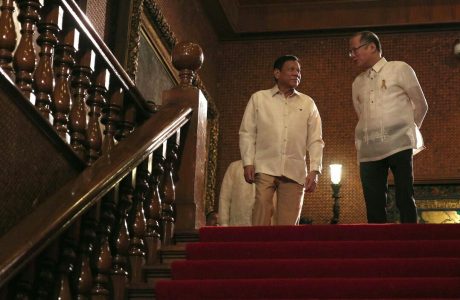
The regime of Philippine President Rodrigo Duterte happened not because of a template for “dictatorship” cut by vintage 1970s “tyrant” Ferdinand Marcos. Duterte “happened” because he represented a voters’ swing to an alternative to the status quo overseen by the progeny governments of the 1986 “people power revolution”.
That revolution promised Filipinos change. Instead it gave them more of the same, but with different names. The Philippines did not transform into a just and transparent democracy, it turned into a caricature of democracy — one where patronage continued to reign, justice was selective, and where local governments cultivated vast bases of voters farmed on acres of “informally-settled” public land.
Riding upon this infrastructure of social dysfunction was a new breed of oligarchs and carpetbaggers who continued a tradition of monopolistic business enterprise that harvested wealth from the Philippines’ hinterlands and the pockets of beneficiaries of OFW remittances and funneled it into Imperial Manila. All the while, a powerful media machine churned out propaganda that kept Filipinos in perpetual awe of the current order which, they were told, was a system to be defended to the death lest the old “evil” order of the Marcos “regime” come back with a vengeance. This was at a cost to the police and the Army both of which went on to suffer bad guy roles in a narrative of heroic martyrs and prayerful “human rights” crusaders.
This environment of perverse liberalism was the opportunity waiting for an alternative to make its mark. Duterte was seen by the Filipino voter as that alternative. It can’t be any simpler than that. The Duterte campaign, by design or by accident (we may never know), thumbed its nose at the trite promises of the old status quo which had worn its political brand equity to tatters after several decades delivering mediocre-to-zero results and, while at it, presented a vision and platform that appealed to the practical needs ofordinary Filipinos.
Put the vision and platform of the Duterte campaign side-by-side with the relatively abstract and high-nosed motherhood hipster aspirations for “social justice”, “human rights”, and “decency” of what today is the Opposition and it became, hands down, the winning narrative in 2016.
In short, the disente narrative of the Liberal Party (LP, a.k.a. the Yellowtards) overpromised and under-delivered and the vote for Duterte in 2016 was the protest vote against that failure. The only tangible achievement following the rise of the Yellowtards is to prove that Filipinos were not poor back in the 1970s because of a lack of freedom. The freedom “won back” in 1986 did not change the fundamental character of Philippine society. Freedom, instead, highlighted the true nature of the character of Philippine society by exhibiting the sorts of politicians Filipinos would go on to freely elect to lead and represent their interests. This freedom also revealed the quality of the entertainment and “information” Filipinos would routinely tune into en masse. It would also go on to reveal how inept Filipinos are at critically evaluating important issues when left to their idle devices (in both the figurative and literal senses of that last phrase).
Note in the above the lack of anything amongst the factors that led to Duterte’s ascent to power that has anything to do with Marcos, his family, or his Martial Law “regime”. That is because Marcos did not make Duterte happen. Filipinos made Duterte happen thanks to Noynoy’s incompetence.

No comments:
Post a Comment